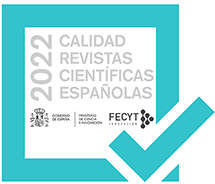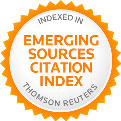The nobiliary concept of play as a mechanism for ethical-political distinction in the Late Middle Ages. (El imaginario lúdico de la nobleza como dispositivo de la distinción ético-política en la Baja Edad Media Occidental).
Resumen
This article examines the problematic meaning, both in concept and practice, of games in the late Middle Ages, using Norbert Elias’ theoretical perspective of the civilizing process. Starting from the fundamental assumption that play is not a practice free of political and ideological content, whose meaning is often found at the heart of social struggles, an evolutionary model of play is proposed where it is not the transformation of practices which is given most importance, but rather the shaping of concepts around the social divisions which these practices reflect. To this end, the comparative methodology used reveals how, in the context of social transformation and medieval mentality, two binary categories of games, parallel and differentiating (games for the nobility/games for the commoners, and games for adults/games for children), developed. At the same time, this paper also addresses the more specific case of physical challenge, and its fundamental role in mental and behavioural changes, over and above the conditions which gave rise to different types of competitions. In particular, the emergence of the concept of infancy, public decorum and politeness, in the context of increasing levels of mechanisms for behavioural self-control, will be studied.
Key words/palabras clave: play | social domination | distinction | Middle Ages | juego | poder | distinción | Edad MediaResumen
El artículo aborda la problemática significación conceptual y práctica del juego en la Baja Edad Media bajo la perspectiva teórica del proceso de la civilización de Norbert Elias. Bajo la idea matriz de que el juego es una práctica no exenta de contenido político e ideológico, que a menudo encuentra su sentido en el seno de las luchas sociales, se plantea un modelo evolutivo del mismo donde no prima tanto la transformación de las prácticas como la configuración de imaginarios alrededor de las divisiones sociales que estas expresan. A este respecto, la metodología comparativa induce a atisbar, en el contexto de las transformaciones sociales y de mentalidad medievales, el desarrollo de dos categorías lúdicas binarias, paralelas y distintivas (juegos nobiliarios/juegos villanos y juegos de adultos/juegos infantiles). Se tratan, asimismo, e indistintamente de lo anterior, los casos particulares de los retos de competencia física y su incardinación en los cambios de mentalidad y comportamiento, más allá de las condiciones que propiciaron las distintas modalidades de concursos caballerescos o villanos, de adultos o infantiles: especialmente la emergencia del concepto de infancia, decoro público, cortesía-civilidad, etc. en un entorno de progresivo aumento de los mecanismos de autocontrol de la conducta.
doi:10.5232/ricyde2008.01202
Texto completo en PDF
---------------------------------------------------------------------
References/referencias
Vicente, M. (1997). Physical imagery and nobiliary distinction in Don Juan Manuel’s ‘Libro de los Estados’: A pedagogical representation of the body in medieval Castil. The International Journal of History of Sport, 14(2), 26-39.
doi:10.1080/09523369708713982
Vicente, M. (2003). La Representación del cuerpo en la corte imaginada de Alfonso X El Sabio. Educación corporal y legitimación de la excelencia en la Segunda Partida. Bulletin of Hispanic Studies, 80, 21-40.
doi:10.3828/bhs.80.1.2
---------------------------------------------------------------------
Palabras clave/key words
Texto completo/Full Text:
PDF------------------------ 0 -------------------------
RICYDE. Revista Internacional de Ciencias del Deporte
![]()

Publisher: Ramón Cantó Alcaraz
ISSN:1885-3137 - Periodicidad Trimestral / Quarterly

